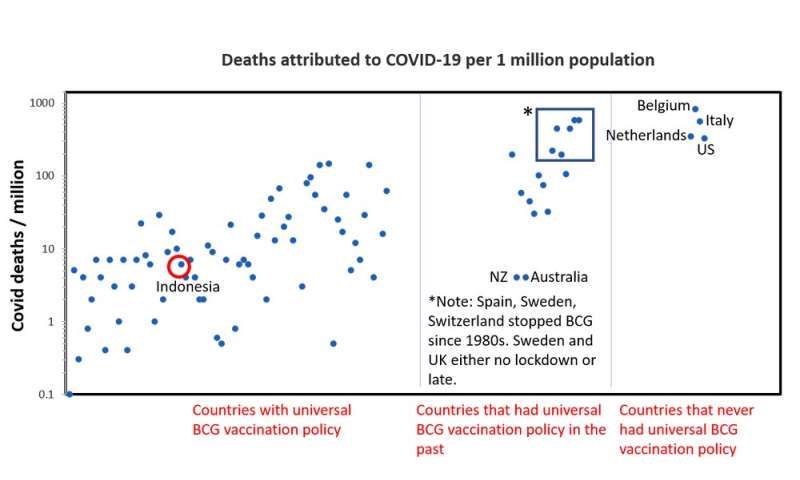
Researchers are investigating whether the anti-turberculosis vaccine bacillus Calmette-Guérin (BCG), which appears to protect recipients from other respiratory infections, could protect against COVID-19.
Recent research suggests COVID-19’s impact is more severe—with more illness and more deaths—in countries that do not routinely administer the BCG vaccine, which has been used since 1921 to prevent tuberculosis infection.
The Serum Institute in India started large-scale clinical trials in April, testing 6,000 “high-risk” individuals, including health-care workers and close contact infected patients.
Researchers in Australia and Europe are also investigating whether BCG protects individuals at high-risk of serious COVID-19 infection, such as the elderly and health-care workers.
Indonesia is one of 17 countries in the world that produce BCG vaccine. It should also perform large-scale clinical trials testing BCG as a COVID-19 vaccine.
COVID-19 in countries with universal BCG vaccine
COVID-19’s impact on both the number of cases and deaths varies widely across countries. It’s influenced by factors such as testing capabilities, demography, the economy, and the quality of health-care systems and lockdown measures.
Another factor that might partially explain the variation is whether a country has a universal childhood BCG vaccination program.
We have compiled the latest data comparing countries’ BCG vaccination programs with their COVID-19 cases and mortality up to June 3.
The data indicates countries without universal policies of BCG vaccination (Italy, the Netherlands, Belgium and the US) have been more severely affected, with a higher number of cases and deaths, compared to countries with universal and long-standing BCG programs.
This is despite the fact these countries are considered to be high income countries. The data also suggests countries with a universal BCG vaccination program had a reduced number of report COVID-19 cases. The combination of reduced illness and death makes BCG vaccination a potential new tool in the fight against COVID-19.
Countries that have not had a universal BCG policy currently have the highest number of COVID-19 death per million inhabitants. The high death rate in countries such as Spain, Switzerland, and Sweden might be attributed to the cessation of universal BCG vaccination in the 1980s.
What Indonesia should do
It is important to note research on COVID-19 is extremely fluid, with different countries at different stages of the pandemic. And the data need to be updated and analyzed accordingly.

While the World Health Organization stated there is yet no evidence on the effectiveness of BCG vaccination on COVID-19, the organization is closely following two clinical trials in Australia and Netherland.
However, given the potential role of BCG and the strategic importance of protection against COVID-19, we recommend Indonesia to:
Indonesia is one of 17 countries that has the capability to manufacture BCG vaccine. It is also of ten countries that are supplying beyond domestic counties. The manufacturer in Indonesia is the state-owned enterprise Biofarma.
Since 1999, Indonesia has carried out BCG vaccinations for children—due to a high risk of tuberculosis. It’s estimated BCG coverage is at 92.2% for newly born infants (0-2 months).
However, tuberculosis incidence is at 395 per 100,000, which is still considerably high. Coverage for poor households might be lower.
It’s important Indonesia begins a BCG booster program.
Building trained immunity
Historically, researchers design vaccines by identifying the “perfect” antigen, molecules that generates long-term, infection-specific responses by the body’s immune system. This then provides immunity on re-encounter with the same disease-causing agent.
However, this approach can take months to years to develop. And it has yet to lead to a successful vaccine against coronaviruses despite efforts against SARS and MERS since 2003.
Another approach is to broadly boost the body’s immune system to fight infection by triggering a form of “non-specific” immune memory, called trained immunity. Trained immunity can arm cells against a broad range of infectious diseases.
BCG is a weakened live bacteria (Mycobacterium bovis), and appears to trigger this form of immunity.
A large body of data suggests BCG vaccination may have benefits beyond the prevention of tuberculosis. This includes protection from respiratory infections unrelated to tuberculosis, as well as a reduced risk of death from such infections.
Recent work indicates BCG vaccination re-programs the body’s immunity and has been linked to enhanced protection against respiratory infections.
Source: Read Full Article